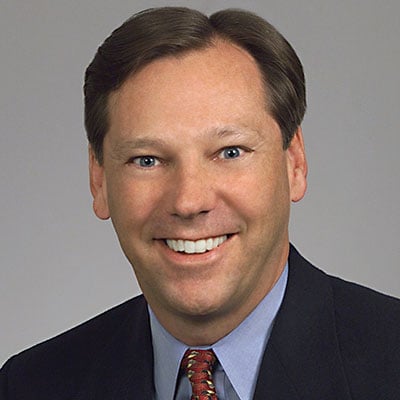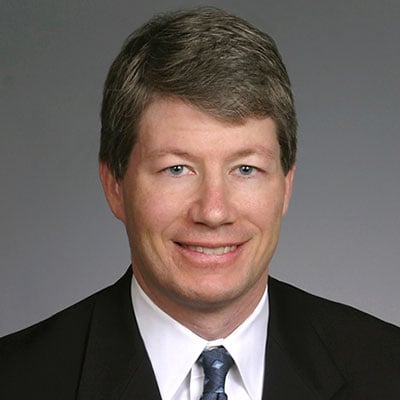IP Litigation Department of the Year - Finalist
The biggest trial win of Robert Krupka's 31-year career began with a visit to his trusts and estates lawyer. In late 2001, while buying a house in Bel Air, California, Krupka, who co-chairs Kirkland & Ellis's IP practice, sought advice from Burton Mitchell of Jeffer Mangels Butler & Marmaro. Mitchell, in turn, asked Krupka for a favor: Would he meet with a client of Mitchell's, an inventor who had been sued for breach of contract by Medtronic, Inc., the giant medical device company? Krupka, who is more used to representing the Goliaths of the world, reluctantly agreed.
But after a three-hour meeting with Gary Michelson, a prolific inventor who holds hundreds of patents on devices for spinal surgery, some of which he had licensed to Medtronic, Krupka realized that the surgeon was more top dog than underdog. Together with lawyers from Jeffer, Mangels, Krupka countersued, accusing Medtronic of breach of contract, underpaying royalties, and patent infringement. After a three-month trial in fall 2004, a jury in Memphis federal court awarded Michelson $510 million. At trial, Medtronic was represented by McDermott, Will & Emery and Baker, Donelson, Bearman, Caldwell & Berkowitz.
Michelson credits the win to Krupka's ability to explain the patented inventions to the jury, and to convey an underlying story of right and wrong. Krupka argued that Medtronic had engaged in a systematic effort to undercut the doctor's inventions. "These cases come down to morality plays," says Michelson. After trial, Krupka spent more than two weeks in New York hammering out a settlement with Medtronic. While other lawyers helped, Krupka was the one who "lost the most sleep," says Michelson. The case settled for $1.35 billion, with Medtronic purchasing 500 patents from Michelson - the largest public patent settlement in history. It landed Michelson at 258 on Forbes magazine's list of 400 richest Americans, and catapulted Kirkland & Ellis to our winner's circle.
The jumbo win-along with some blockbuster verdicts from John Desmarais-also catapulted Kirkland & Ellis to our list of finalists. In March, Desmarais put an end to another epic saga. He represented Infineon Technologies AG, which makes memory chips, in a suit brought by Rambus Inc., for patent infringement and antitrust violations. Desmarais won a trial on fraud claims against Rambus in 2001, but the verdict was reversed on appeal. For round two Desmarais launched a new offensive: "I had learned that Rambus produced documents to the Federal Trade Commission [in related litigation] that they had not produced to us," says Desmarais. After he won a discovery battle, 30 new boxes arrived, and Desmarais's team found an internal Rambus e-mail calling for document shredding. That led Desmarais to believe that Rambus had intentionally destroyed important evidence. Desmarais convinced Judge Robert Payne to pierce Rambus's attorney-client privilege, and Desmarais and a team of Kirkland lawyers deposed Rambus executives and outside lawyers, including ones from Cooley Godward, Fenwick & West, and the firm then known as Gray Cary Ware & Freidenrich, who revealed that the document destruction took place while Rambus was preparing for litigation. This was the key to Desmarais's claims of litigation misconduct. A three-day trial on unclean hands and spoliation was held in March.
At trial, says co-counsel Brian Riopelle of Richmond's McGuireWoods, Desmarais connected "absolutely" with the judge. "John is probably the finest patent litigator I've ever seen in court," says Riopelle. After the trial, Judge Payne signaled that he would rule against Rambus. But before Payne could enter his final judgment, Rambus scrambled to settle all ongoing litigation with Infineon-including cases in California and Europe. Under the agreement, Infineon has a license to Rambus's entire patent portfolio. The settlement ended a costly patent war, and put Infineon at an advantage over its competitors, who are still mired in patent litigation with Rambus.
Desmarais, along with co-counsel Richard DeLucia, a partner in New York's Kenyon & Kenyon, also won a patent infringement for Boston Scientific against Johnson & Johnson in July. Boston had accused J&J of infringing patents on Boston Scientific's drug-eluting stent-a drug-coated metal heart implant that prevents artery blockage. The device generated $2 billion in sales in its first year on the market.
That win was a nice pick-me-up. Just a month before, Desmarais lost a different trial for Boston Scientific, also in Delaware against J&J, facing the same opposing counsel, Patterson Belknap Webb & Tyler. Stent technology was again at issue, although different multibillion-dollar products were at stake. The damages of both trials have not been set.
Krupka was also nursing his own wound last year. In May, a month before the Boston Scientific loss, Krupka's client Alcon Laboratories, Inc. was hit with a $90 million verdict in a patent infringement suit over cataract surgery equipment. James Isbester of Isbester & Associates represented Advanced Medical Optics, the smaller eye surgery company that won. It was the first jury trial loss of Krupka's career: "I got hammered," he says. (Post-trial motions are pending, and Alcon plans to appeal.) The two losses kept Kirkland from winning this year's contest, but with trials scheduled next year for Lucent Technologies, Inc., and Infineon, and the stent battle raging, the firm might have another shot at the trophy.
In pretrial work, Kirkland boasted an impressive run of victories. Partner David Callahan won a summary judgment for Amazon, Inc., in a case brought by IXPL Holdings, a patent-holding company; Peter Armenio took another for Boston Scientific against Medtronic over stents; and Daniel Attridge and Edward Donovan won one for Barr Laboratories that allowed Barr's generic version of a diabetes drug to go to market. Good preventive medicine, but, like all other Kirkland wins last year, it was overshadowed by Krupka's surgical strike on Medtronic.
REPRINTED WITH PERMISSION FROM THE JANUARY 2006 EDITION OF IP LAW & BUSINESS © 2006 ALM PROPERTIES, INC. ALL RIGHTS RESERVED. FURTHER DUPLICATION WITHOUT PERMISSION IS PROHIBITED


